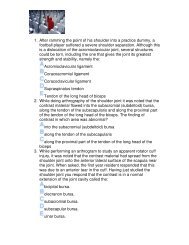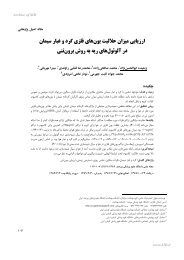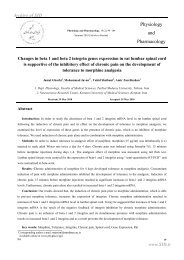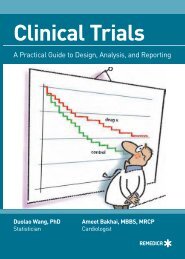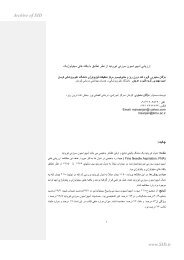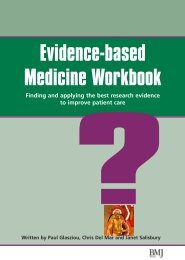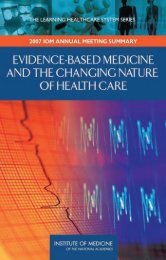Evidence-based Medicine Toolkit
Evidence-based Medicine Toolkit
Evidence-based Medicine Toolkit
Create successful ePaper yourself
Turn your PDF publications into a flip-book with our unique Google optimized e-Paper software.
<strong>Evidence</strong>-<strong>based</strong> medicine: glossary of terms 81Ecological survey: a study <strong>based</strong> on aggregated data for some populationas it exists at some point or points in time; to investigate the relationshipof an exposure to a known or presumed risk factor for a specifiedoutcome.EER: experimental event rate; see Event rate.Effectiveness: a measure of the benefit resulting from an intervention fora given health problem under usual conditions of clinical care for a particulargroup.Efficacy: a measure of the benefit resulting from an intervention for a givenhealth problem under the ideal conditions of an investigation.Ethnography: the study of people in their natural settings; a descriptiveaccount of social life and culture in a defined social system, <strong>based</strong> onqualitative methods.Event rate: the proportion of patients in a group in whom an event isobserved. See p. 55.<strong>Evidence</strong>-<strong>based</strong> health care: the application of the principles of evidence<strong>based</strong>medicine (see below) to all professions associated with health care,including purchasing and management.<strong>Evidence</strong>-<strong>based</strong> medicine: the conscientious, explicit, and judicious useof current best evidence in making decisions about the care of individualpatients. The practice of evidence-<strong>based</strong> medicine means integrating individualclinical expertise with the best available external clinical evidencefrom systematic research.Exclusion criteria: conditions that preclude entrance of candidates into aninvestigation even if they meet the inclusion criteria.f: an estimate of the chance of an event for your patient, expressed as adecimal fraction of the control group’s risk (event rate). See p. 74.Focus groups: a research method of interviewing people while they areinteracting in small groups.Follow up: observation over a period of time of an individual, group, orinitially defined population whose relevant characteristics have beenassessed in order to observe changes in health status or health-relatedvariables.Forrest plot: a diagrammatic representation of the results of individualtrials in a meta-analysis.Funnel plot: a method of graphing the results of trials in a meta-analysis toshow if the results have been affected by publication bias.Gold standard: see Reference standard.Grounded theory: an approach to qualitative research in which the investigatordevelops conceptual categories from the data and then makesnew observations to develop these categories. Hypotheses are developeddirectly form data.



